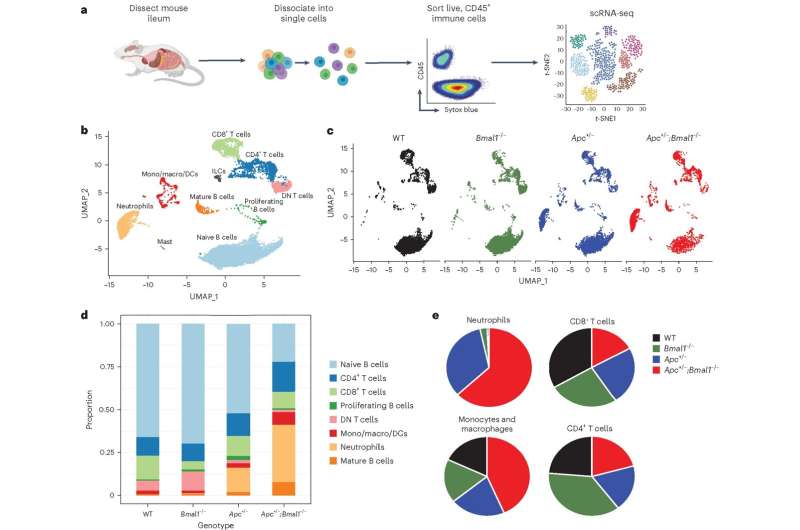This article has been reviewed according to Science X's editorial process and policies. Editors have highlighted the following attributes while ensuring the content's credibility:
fact-checked
peer-reviewed publication
trusted source
proofread
Study reveals circadian clock can be leveraged to enhance cancer immunotherapy

A multidisciplinary research team at the University of California, Irvine has revealed that the circadian clock—the biological pacemaker that governs daily rhythms in physiological processes, including immune functions—can be leveraged to enhance the efficacy of checkpoint inhibitor cancer therapy. Checkpoint inhibitors block different proteins from binding to tumor cells, allowing the immune system's T cells to kill the tumor.
The study, published in Nature Immunology, provides deeper insights into the intricate relationship among the circadian clock, immune regulation and tumor development and has found that a therapeutic approach optimizing time-of-day delivery based on an individual's unique circadian patterns offers new avenues for prevention and treatment.
"Disruption of the internal biological pacemaker is an inherent aspect of modern society that may contribute to the rising incidence of many cancer types. We found that proper regulation of circadian rhythms is necessary to suppress inflammation and support peak immune function," said corresponding author Selma Masri, UC Irvine associate professor of biological chemistry. "Understanding precisely how circadian disruption promotes disease progression could lead to behavior modification to reduce cancer risk."
Team members used an advanced single-cell RNA sequencing technique in a genetic model of colorectal cancer and identified clock-dependent changes controlling the number of myeloid-derived cells that suppress T cell activation. They discovered that disruption of the internal clock in the epithelial cells lining the intestine alters secretion of cytokine proteins, leading to heightened inflammation, increased numbers of immunosuppressive myeloid cells and cancer progression.
These findings were leveraged to demonstrate that providing immunotherapy at the time of day when these immunosuppressive myeloid cells are most abundant significantly enhanced the efficacy of immune checkpoint blockades in solid tumors.
"As we enhance our understanding of the fundamental mechanism of circadian regulation of immunity, we will be able to harness the power of the body's natural rhythms to fight cancer and develop more personalized and effective treatment strategies," said lead author Bridget Fortin, a UC Irvine doctoral student in the Department of Biological Chemistry.
While this study represents a significant step forward in defining circadian control of anti-tumor immunity, the team believes future research should focus on exploring additional factors and cell types influencing time-of-day response to checkpoint inhibitor therapy.
Other team members included UC Irvine School of Medicine graduate students and faculty from the departments of biological chemistry, physiology and biophysics, surgery, and medicine.
More information: Bridget M. Fortin et al, Circadian control of tumor immunosuppression affects efficacy of immune checkpoint blockade, Nature Immunology (2024). DOI: 10.1038/s41590-024-01859-0





















